The Soong Dynasty
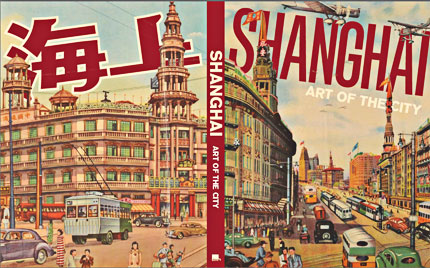
It is my contention that part of the attraction of Hong Kong is that the city so many of us love and remember fondly is actually another place- a city named Shanghai. The Fall of the Kuomintang to the Reds caused enormous dislocation in the most western and amazing city in all the Far East- a gem of art deco architecture and lovely cantonments plopped down in the middle of everything completely Chinese.
I was walking along a street there a long time ago, and had one of those moments of complete disorientation. I thought for an instant that I was in Hanoi- the walls and the stonework were distinctive. I mentioned it, and one of the men with whom I was ambling along explained it to me: “You are in the old French cantonment. You are not in Shanghai. You are in France.”
I nodded in amazement. What a city, and what times it has seen. If my pal Left Coast Guy is reading, I would be interested in his recollections of the first US Navy port visit since 1948.
Part of the big riddle of the PRC is how we got it all so wrong. The train-wreck of European colonization, the opium wars, 55 Days at Peking and the Open Door policy of the Americans is way too broad a palate on which to paint this morning.
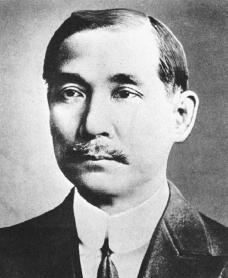
(Dr. Sun Yat-sen).
My first understanding of just how pro-American luminaries like Dr. Sun Yat-Sen left a legacy of democratic tradition that morphed into the government of the arguably fascist monster Chiang Kai-shek and the struggle with the thug Mao Tse-tung is frankly bewildering.
I first learned of how deeply we were entwined with the history of the “mysterious east” when I stumbled on Sterling Seagrave’s marvelous work “The Soong Dynasty.”
It is really sort of a nuts tale. The Soong family are the descendants of a Chinese runaway who grew up in America under the protection of the Methodist church. He returned to his homeland and cleaned up selling bibles to the masses. He also shepherded his family into becoming the key players in the Chinese government, and had exceptional influence with the American government and media. The Soong family comprised the hard core of the ruling elite, connected to everything and everyone who mattered in the Middle Kingdom.
The pivotal generation for America and China were the three Soong sisters of the early part of the 20th century. Seagrave quoted the saying of the time: “One loved money, one loved power, and one loved China.”
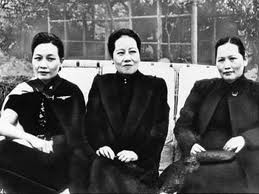
Ai-ling Soong married H.H. Kung, the richest man in China, May-ling married Chiang Kai-shek of the Kuomintang, and Ching-ling married Sun Yat-sen, denounced the corruption of the Kuomintang, and became one of the three non-communist leaders chosen as Vice Chairmen of the People’s Republic in the 1950’s. The brothers T.V. Soong, T.A. Soong, and T.L. Soong were prominent bankers and financiers. T.V. was Prime Minister under the Kuomintang.
Chiang Kai-shek, the Generalissimo I remember from childhood, and whose tomb I visited in Taipai years later, got his start as an opium gangster in Shanghai’s Green Tong. At one point, the Brits wanted him for murder, and he maneuvered himself into a position where he could personally extort billions in Lend-Lease and foreign aid. Between him and all the Soong children (except Ching-ling) they were perhaps the richest family on the planet.
China was lost in 1949, when the KMT pulled out of the Mainland and left it to the Reds. But the long shadow of that, and the enmity of the US Government to Mao’s victorious legions undoubtedly contributed to the eventual conflict in Vietnam, where I thought I was when I was actually walking in Shanghai.
Anyway, Hong Kong and Macau where the other vestiges of the Bad Old Days, and that is where the money and the refugees went, and that is why the Hong Kong we knew was such an amazing place- being the creation of a zillion other places.
My Left Coast Attorney wrote me about his time there, and thought I would pass it along:
“Vic-
Very nostalgic reminiscences of Hong Kong early on. Triggers a lot of memories.
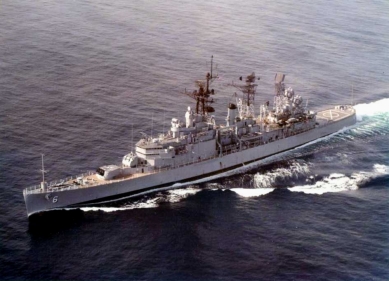
My first trip to HK was on Providence in March 1968. I read constantly to finish James Clavell’s Tai Pan before we moored at HMS TAMAR. Besides getting measured for suits, I took the advice of John Soong, my Princeton club mate and classmate, to call his parents who always loved to entertain Princetonians. So I did. Mrs. Soong said: “You must come to dinner! Please bring five or six of your fellow junior officers. We’ll send a car to pick you up at 6pm.”
So at 6pm a chauffeured Chrysler Imperial pulled up to the pier and 4 or 5 of us– awed– embarked. The driver, in full chauffer regalia, drove us up Victoria Peak to Barker Road, then along the hillside road to a stately Victorian mansion– the former British governor’s mansion from the end of the 19th century.
Mrs. Soong and John Soong, senior, greeted us warmly and effusively. We learn soon that John Sr. is the Managing Director (CEO) of Mobil Oil Hong Kong, and made a fortune for Mobil by developing land in the New Territories into apartments to accommodate the constant flow of immigrants from Canton province into Hong Kong. The Soongs also invited their daughter Lydia and her fiancé Tom, heir to the Hong Kong Shanghai Bank (now HKSB).
The Soongs are great conversationalists and entertainers. John had been educated at Notre Dame University in the US, then served in the US Army in China as General Marshall’s aide de camp during WW II. Mrs. Soong had lived through the Japanese “Rape of Nanking” during the war, and was still extraordinarily animated about the event. We sat at an expandable circular rosewood table with a huge lazy susan, to be served Chinese style with a dozen exotic dishes.
The favorite dish for me and my shipmates was bean sprouts stir fried in a soy sauce, causing gales of laughter from Mrs. Soong, because it was the one Chinese peasant dish her kitchen staff served, and she said it was always Americans’ favorite.
The Soongs couldn’t have been more charming. I saw them again in Hong Kong over the years during my many visits, and invited John Sr. to a dinner at the Rancho Bernardo Inn when he was in San Diego for an oil producer’s conference.
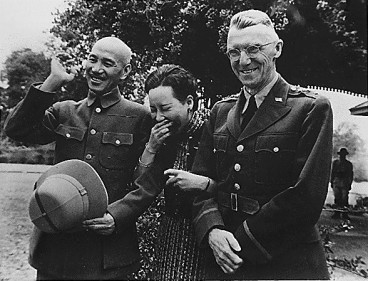
(Chiang, Madam Chiang nee Soong and Joe Stillwell in happier times).
The reason was another vet pal’s neighbor here had been General Stillwell’s aide de camp in China, and Stillwell and Marshall apparently hated each other and were always butting heads. We thought it would interesting 40 years later to sit the two ADCs at the same dinner table. Thankfully, there were no sparks flying, and the two men had generous and funny recollections of their time serving the generals as young ADC officers.
John told the story of his long career with Mobil Oil, starting with their operation in Shanghai after the war in the late 1940s. Then he told of Mao’s Communist revolution in China, and how in 1949 they took over Shanghai, casting fear and doubt in the minds of the foreigners stationed there with their international corporations.
Mao told them all not to worry, the communists would not be nationalizing the international corporations. Instead, Mao imposed a first year 7% gross profits tax on all the corporations, then 40%, then up to 70% in the following years. Responding to the corporate howls of objection, Mao informed them “I told you I wouldn’t nationalize your corporations. You still own your means of production– no one else in China does, this being a communist state.”
It was mutually agreed at the communist takeover that the families of all the foreigners (including the “foreigner” Soong family from British Hong Kong) would be allowed to leave, and all the men working for the corporations were billeted dormitory-style in rooms of a local hotel, two to a room.
I mentioned that my uncle by marriage, Victor Butoff, a White Russian from Da Lien, also worked in Shanghai when Mao took over. John Sr.’s jaw dropped and he stared at me. “I have known you for 20 years and you never mentioned this! Victor was my roommate in Shanghai from 1949 until we all left!”
Small world.
I was there in 1984 as the “White Paper” between UK and PRC was being negotiated for the terms of the turnover in 1999 when the UK’s lease on the New Territories was up, and knew folks at the British Embassy in Beijing who were involved in those negotiations.
The best finesse in the complex negotiations was when an apparently insurmountable impasse was reached with the PRC, the UK delegation threatened to issue British passports to all 6 million Chinese in Hong Kong so they could travel freely or escape the Crown Colony.
The PRC relented on their demands. My last trip to Hong Kong was 23 years ago as I was wrapping up my groundwork for the American Bar Association’s Cambodia law revision program.
The turnover had not occurred yet, but I noticed subtle differences in the attitudes of the locals: cab drivers and some shopkeepers suddenly did not understand English and exhibited surly attitudes. I thought it did not bode well for things to come.”
My pal was right. I felt strongly enough about the whole thing- and that lovely town- that I dispatched by Junior High School aged son to visit some friends who were living in the Colony just before the reversion in 1997.
I wanted him to see something really special, and I think he did. I confess that I kind of freaked out when he sent me an e-mail that said he was in the People’s Republic- the borders were open.
Copyright Vic and the Left Coast Attorney 2014
www.vicsocotra.com
Twitter: @jayare303
